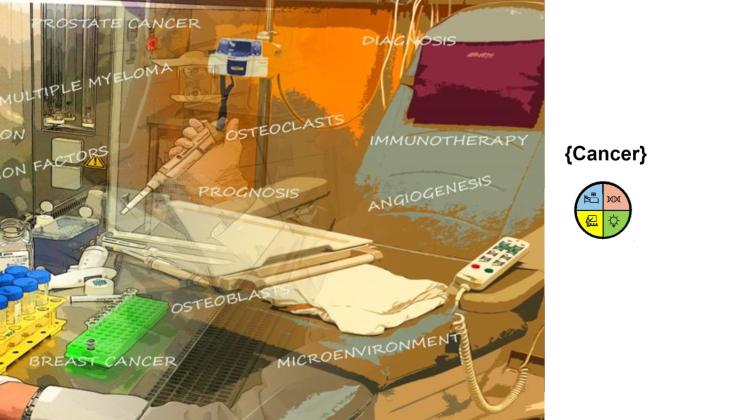
Research
The close interactions between basic researchers and physicians together with a translational medicine approach are imperative prerequisites for clinical relevant innovations in Oncology and Hematology.

Research projects of the Division of Moleculare Oncology and Hematology
KL/K.Podar
Researchproject Division Moleculare Oncology and Hematology
KL/K.Podar
Researchproject Division Moleculare Oncology and Hematology
KL/K.Podar
Researchproject Division Moleculare Oncology and Hematology
KL/K.Podar
Researchproject Division Moleculare Oncology and Hematology
KL/K.Podar
Researchproject Division Moleculare Oncology and Hematology
KL/K.Podar
Researchproject Division Moleculare Oncology and Hematology
KL/K.Podar
Researchproject Division Moleculare Oncology and Hematology
KL/Klaus Podar
Researchproject Division Moleculare Oncology and Hematology
KL/K.Podar
Forschungsprojekt Fachbereich Molekulare Onkologie und Hämatologie
KL/K.Podar
Forschungsprojekt Fachbereich Molekulare Onkologie und Hämatologie
KL/K.Podar
Researchproject Division Moleculare Oncology and Hematology
KL/K.Podar
Researchproject Division Moleculare Oncology and Hematology
KL/K.PodarBASIC RESEARCH
In basic research, the Division of Molecular Oncology and Hematology seeks to: (1) decipher molecular processes that contribute to the development and progression of hematologic (e.g., multiple myeloma, myeloproliferative disorders) and solid (e.g., breast cancer, genitourinary carcinomas) malignancies within the tumor microenvironment; (2) to identify novel biomarkers; and (3) to preclinically develop and evaluate novel agents and therapeutic strategies.
- the pathophysiological role of AP-1 family transcription factors in multiple myeloma (Fan et al., Leukemia 2017 and Leukemia 2021) and breast carcinoma.
- the pathophysiological role of the anti-apoptotic Bcl-2 family member Mcl-1 (Bashari et al. Breast Cancer Res 2016; Vallet et al, Breast Cancer Res Treat 2019).
- approaches to therapeutically reactivate the tumor-associated immune system.
- targeted degradation of tumor-associated proteins
- identifying molecular mechanisms that contribute to tumor-associated bone disease (Vallet et al, PLoS One 2016).
CLINICAL RESEARCH:
In addition to basic research projects, the group contributes to clinical trials, which investigate novel treatment regimens for induction and maintenance as well as relapsed/ refractory patients, in multiple myeloma and urothelial carcinoma in particular. For example, we recently contributed to a study demonstrating the anti-myeloma activity of the first-in-class selective nucleus export inhibitor (SINE), selinexor, which led to the approval of this agent in combination with dexamethasone for patients with refractory triple myeloma (Chari et al., N Engl J Med, 2019).
- A phase 3 Study of Elranatamab (PF-06863135) Monotherapy and Elranatamab + Daratumumab Versus Daratumumab + Pomalidomide + Dexamethasone in Participants With Relapsed/Refractory Multiple Myeloma (MAGNETISMM-5) (Ongoing)
- A randomized phase 3 non-inferiority trial assessing lenalidomide, bortezomib and dexamethasone induction therapy with either intravenous or subcutaneous isatuximab in patients with newly diagnosed multiple myeloma (GMMG-HD8 / DSMM-XIX IITTrial)
- Phase 3 Study of Teclistamab in Combination with Lenalidomide versus Lenalidomide Alone in Participants with Newly Diagnosed Multiple Myeloma as Maintenance Therapy Following Autologous Stem Cell Transplantation (MajesTEC-4)
- CA017-078: A Phase 3, Randomized, Study of Neoadjuvant Chemotherapy alone versus Neoadjuvant Chemotherapy plus Nivolumab or Nivolumab and BMS-986205, Followed by Continued Post- Surgery Therapy with Nivolumab or Nivolumab and BMS-986205 in Participants with Muscle-Invasive Bladder Cancer (Closed)
- A phase 3 Study to Evaluate CC-92480, Bortezomib and Dexamethasone (480Vd) Versus Pomalidomide, Bortezomib and Dexamethasone (PVd) in Participants With Relapsed or Refractory Multiple Myeloma (RRMM) (Successor-1) Treatment Combination of Durvalumab, Tremelimumab and Enfortumab Vedotin or Durvalumab and Enfortumab Vedotin in Patients With Muscle Invasive Bladder Cancer Ineligible to Cisplatin or Who Refuse Cisplatin (VOLGA) (in preparation).
- many more in preparation
If you or your physician are interested in these studies, please write to Klaus.podar@krems.lknoe.at or Sonia.vallet@krems.lknoe.at
Research projects of the Division of Molecular Oncology & Hematology
The Division of Molecular Oncology & Hematology was founded in October 2022 and replaced the former scientific working group Molecular Hematology & Oncology. Some of the projects mentioned are therefore still assigned to the scientific working group.
Please visit our research information system KRIS for a comprehensive overview. Below you will find an excerpt of projects.


